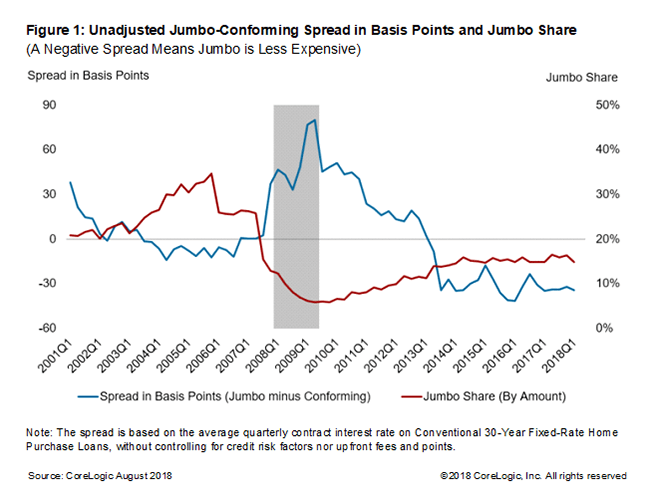Jumbo Loan: Financing Options for High-Value Properties
Jumbo Loan: Financing Options for High-Value Properties
Blog Article
The Effect of Jumbo Financings on Your Financing Options: What You Need to Know Before Applying
Jumbo loans can play a crucial duty in shaping your financing alternatives, especially when it comes to acquiring high-value residential or commercial properties. Understanding the equilibrium in between the benefits and obstacles posed by these loans is crucial for potential borrowers.
Recognizing Jumbo Car Loans
Understanding Jumbo Loans calls for a clear grasp of their one-of-a-kind qualities and demands. Big car loans are a kind of home mortgage that goes beyond the conforming financing restrictions established by the Federal Housing Money Agency (FHFA) These limitations differ by area yet usually cap at $647,200 in most areas, making jumbo finances crucial for funding higher-priced properties.
Among the defining functions of big financings is that they are not eligible for acquisition by Fannie Mae or Freddie Mac, which brings about stricter underwriting guidelines. Borrowers need to often show a greater credit history, typically above 700, and offer significant paperwork of income and possessions. In addition, lending institutions might require a larger down payment-- usually 20% or even more-- to mitigate risk.
Interest rates on big finances can be somewhat more than those for conforming financings as a result of the enhanced danger presumed by the loan provider. The lack of personal mortgage insurance policy (PMI) can offset some of these costs. Understanding these variables is crucial for possible consumers, as they considerably affect the terms and usefulness of safeguarding a big car loan in today's competitive real estate market.
Benefits of Jumbo Lendings
Jumbo fundings provide distinct benefits for buyers seeking to purchase high-value buildings that surpass traditional lending limits. Among the main benefits of big finances is their capability to finance bigger amounts, allowing customers to obtain homes in premium markets without the restraints enforced by adhering loan limitations - jumbo loan. This flexibility makes it possible for property buyers to see a more comprehensive series of homes that might better suit their choices and needs
In addition, jumbo financings commonly come with affordable rates of interest, particularly for debtors with solid credit profiles. This can bring about considerable financial savings over the life of the funding, making homeownership more budget-friendly over time. Big financings can be tailored to fit specific economic situations, providing different terms and amortization alternatives that align with the customer's goals.

Challenges of Jumbo Financings
Navigating the intricacies of jumbo lendings offers a number of challenges that possible debtors should understand before proceeding. One considerable hurdle is the rigorous loaning criteria enforced by financial institutions. Unlike adapting finances, jumbo financings are not backed by government-sponsored business, leading lenders to embrace even more extensive criteria. This typically consists of higher credit report needs and considerable documents to verify revenue and assets (jumbo loan).
Furthermore, big loans usually include greater interest rates compared to standard loans. This raised price can dramatically impact monthly payments and general cost, making it necessary for consumers to very carefully examine their economic scenario. The down payment requirements for big financings can be significant, usually varying from 10% to 20% or even more, which can be a barrier for numerous prospective homeowners.
Another obstacle exists in the restricted schedule of big funding items, as not all lenders provide them. This can cause a reduced swimming pool of choices, making it critical for customers to carry out complete research and potentially seek specialized loan providers. Overall, understanding these challenges is important for any individual taking into consideration a big loan, as it ensures informed decision-making and better financial planning.
Qualification Criteria
For those considering a jumbo car loan, satisfying the qualification criteria is an essential action in the application process. Unlike conventional lendings, jumbo loans are not backed by federal government companies, resulting in more stringent needs.
First of all, a solid credit rating is important; most lending institutions need a minimal score of 700. In addition, debtors are generally anticipated to demonstrate a significant income to guarantee they can comfortably handle higher month-to-month repayments.
Down settlement demands for big car loans are also substantial. Customers need to anticipate taking down a minimum of 20% of the property's purchase cost, although some lending institutions may provide alternatives as low as 10%. Demonstrating cash reserves is critical; lending institutions typically call for evidence of discover this enough liquid properties to cover numerous months' worth of mortgage settlements.
Comparing Financing Options
When evaluating funding alternatives for high-value residential properties, recognizing the differences in between numerous lending types is vital. Big financings, which go beyond conforming lending limitations, generally come with stricter qualifications and higher interest rates than standard loans. These lendings are not backed by government-sponsored enterprises, which increases the lending institution's threat and can bring about a lot more rigid underwriting requirements.
In contrast, conventional lendings offer even more versatility and are typically simpler to obtain for borrowers with strong credit accounts. They might come with reduced rate of interest rates and a wider selection of choices, such as repaired or variable-rate mortgages. In addition, government-backed finances, like FHA or VA fundings, offer possibilities for reduced down payments and even more tolerant credit history requirements, though they additionally impose limits on the financing amounts.

Verdict
To conclude, big loans present both opportunities and challenges for prospective homebuyers seeking financing for high-value homes. While these car loans permit larger amounts without the problem of exclusive home loan insurance, they include strict credentials demands and possible drawbacks such as greater passion prices. A detailed understanding of the benefits and difficulties related to big financings is crucial for find out here making educated choices that line up with long-term economic objectives and objectives in the realty market.

Report this page